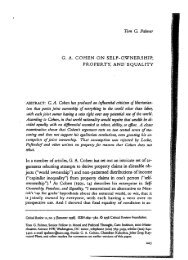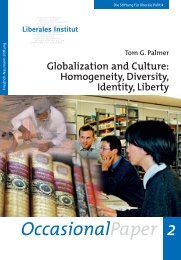Are Patents and Copyrights Morally Justified? - Tom G. Palmer
Are Patents and Copyrights Morally Justified? - Tom G. Palmer
Are Patents and Copyrights Morally Justified? - Tom G. Palmer
You also want an ePaper? Increase the reach of your titles
YUMPU automatically turns print PDFs into web optimized ePapers that Google loves.
No. 3] <strong>Are</strong> <strong>Patents</strong> <strong>and</strong> <strong>Copyrights</strong> <strong>Morally</strong><strong>Justified</strong>? 885<br />
on labor-based moral desert, as we are not the products of our<br />
own labor. But that is the subject of the next section of this<br />
Article.<br />
III. PERSONALITY AND INTELLECTUAL PROPERTY RIGHTS<br />
The development of personality has been linked to property<br />
rights by a number of pro-property writers, notably the German<br />
classical liberal Wilhelm von Humboldt. In his seminal<br />
work, The Limits of State Action, von Humboldt declared that<br />
“[t]he true end ofMan. . .is the highest <strong>and</strong> most harmonious<br />
development of his powers to a complete <strong>and</strong> consistent<br />
whole.” 69 Further, he wrote:<br />
[R]eason cannot desire for man any other condition than<br />
that in which each individual not only enjoys the most absolute<br />
freedom of developing himself by his own energies, in<br />
his perfect individuality, but in which each external nature<br />
itself is left unfashioned by any human agency, but only receives<br />
the impress given to it by each individual by himself<br />
<strong>and</strong> of his own free will, to the measure of his wants <strong>and</strong><br />
instincts, <strong>and</strong> restricted only by the limits of his powers <strong>and</strong><br />
his rights. 7 °<br />
“Every citizen,” writes von Humboldt, “must be in a position<br />
to act without hindrance <strong>and</strong> just as he pleases, so long as he<br />
does not transgress the law.. . - If he is deprived of this liberty,<br />
then his right is violated, <strong>and</strong> the cultivation of his faculties—<br />
the development ofhis individuality—suffers.” 7 ’<br />
Respectfor property is intimately related to this selfdevelopment.<br />
“[T]he idea of property grows only in company with the<br />
idea of freedom, <strong>and</strong> it is to the sense ofproperty that we owe<br />
the most vigorous activity.” 72 Provision of security from external<br />
force is the proper end of government: “I call the citizens of<br />
a State secure, when, living together in the full enjoyment of<br />
their due rights of person <strong>and</strong> prop~erty,they are out of the<br />
reach of any external disturbance from the encroachments of<br />
others . . . .<br />
This line of argument—deriving property from the require-<br />
69. W. VON HUMBOLDT, THE LIMITS OF STATE AcrioN 16 (J. Coulthard trans., J.W.<br />
Burrow ed. 1969).<br />
70. Id. at 20.21.<br />
71. Id. at 116.<br />
72. Id. at 89.<br />
73. Id. at 83.











